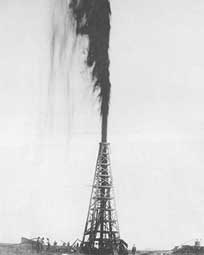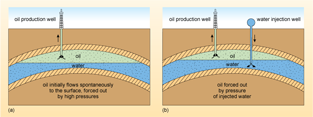6.1 Conventional oil
Conventional oil is a loosely defined term covering any crude oil that can be extracted from the ground in the 'conventional' way; that is, it is extracted using standard oil well technology.
Conventional oil is generally found in underground rocks known as reservoirs, where it can sometimes be associated with natural gas. The oil is generally under great pressure and initially when an oil well is drilled, the oil will spontaneously flow to the surface. Indeed the problem at this stage is how to control the flow and avoid a 'blowout', an occurrence that plagued the early oil wells and cost many lives (Figure 8).

Modern oil wells are designed to avoid disastrous blowouts and have sophisticated pressure release systems which allow the controlled release of oil at the surface. However, blowouts still occur occasionally, as you will see in Section 6.2.
The stage at which oil flows spontaneously to the surface is known as the primary recovery phase (Figure 9a) and only a small proportion of the oil in the reservoir can be extracted in this way. Eventually, the pressure in the oil reservoir will drop, and to prolong extraction it becomes necessary to maintain the pressure underground by injecting pressurised water or gas, or both, into the reservoir (Figure 9b). This phase of production is known as the secondary recovery phase.
In order to improve recovery still further, chemical or biological agents may be added to the injected water, or steam may be pumped into the reservoir, in order to reduce the viscosity (thickness) of the crude oil. The term 'viscosity' may be new to you; in scientific terms, viscosity is a measure of how easily a liquid flows - a liquid with low viscosity such as water flows easily, whilst a liquid with high viscosity (e.g. treacle or honey) does not flow easily.

Under ideal conditions, secondary recovery methods can result in up to 70% of the initial oil present in the reservoir being recovered, but the processes are expensive and for many smaller fields the amount of extra oil recovered may not be worth the investment.
